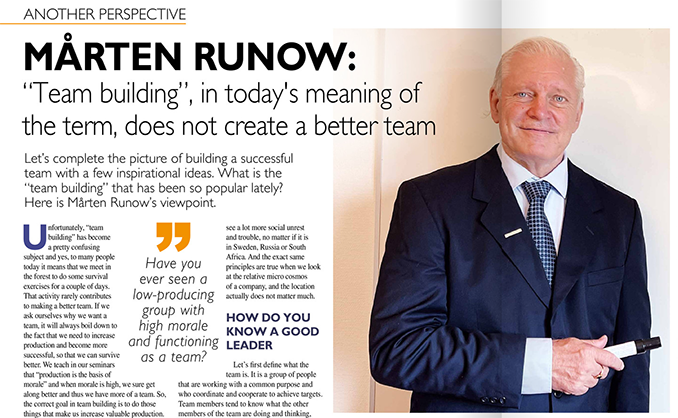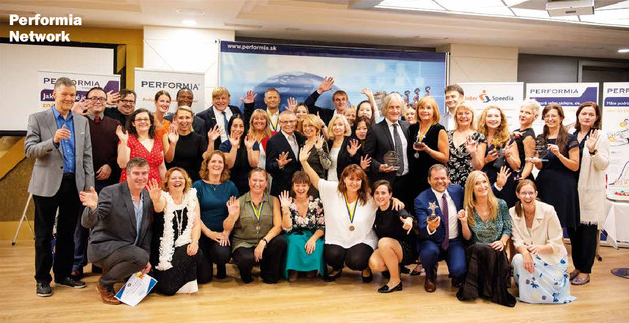
MÅRTEN RUNOW: “Team building”, in today’s meaning of the term, does not create a better team
Let’s complete the picture of building a successful team with a few inspirational ideas. What is the “team building” that has been so popular lately? Here is Mårten Runow’s viewpoint.
Unfortunately, “team building” has become a pretty confusing subject and yes, to many people today it means that we meet in the forest to do some survival exercises for a couple of days. That activity rarely contributes to making a better team. If we ask ourselves why we want a team, it will always boil down to the fact that we need to increase production and become more successful, so that we can survive better. We teach in our seminars that “production is the basis of morale” and when morale is high, we sure get along better and thus we have more of a team. So, the correct goal in team building is to do those things that make us increase valuable production. Have you ever seen a low-producing group with high morale and functioning as a team? I have not.
TEAM VERSUS PRODUCTION
Because Performia now operates in over 30 countries on all continents, I have had an opportunity to see with my own eyes how the principles of production and its connection to “team spirit” and decency are the same, no matter where you look. In Taiwan for example there is almost no unemployment, and they have a culture that supports and expects production from all people who are physically able to work. When their production peaked, criminality was extremely low. In areas where incentives to produce get taken away, you will inevitably see a lot more social unrest and trouble, no matter if it is in Sweden, Russia or South Africa. And the exact same principles are true when we look at the relative micro cosmos of a company, and the location actually does not matter much.
HOW DO YOU KNOW A GOOD LEADER
Let’s first define what the team is. It is a group of people that are working with a common purpose and who coordinate and cooperate to achieve targets. Team members tend to know what the other members of the team are doing and thinking, and they normally get along great.
From that, it follows that a great leader makes sure there is a common and known purpose for the activity and gets all members to push in that same direction. He/She makes sure there is a lot of relevant information flowing between the different departments and their people so that everyone can know how the group is doing overall. And he/she will make sure that each individual, as well as the group as a whole, is producing on a viable level. Thus “team building” is not something we do two days per year, but rather something which is an integral part of what we do every single day. If we succeed and meet our targets, we can then go for a couple of days to have fun in the forest or climb some mountains as a reward for having been a team.
Have you ever seen a low-producing group with high morale and functioning as a team?
THE BASIC INGREDIENTS FOR BUILDING A SUCCESSFUL TEAM
“Team building” actually starts when you recruit new people. If you hire people who are not really interested in production but who are more interested in joining a successful company to get a high salary, it will be very, very hard for you to make team members out of those people. Not impossible but A LOT harder. Thus if you know how to attract and hire productive and willing people, you have already removed the biggest barrier to building a team.
Sure, productive people can sometimes have some different ideas and get into arguments, but if they do, they can normally sort it out rather fast (within a few minutes or max few hours) and then keep going in the right direction. When unproductive people get into conflicts, they can often make that problem into something that could consume weeks, months and sometimes even years. So, starting with people who actually like to be productive handles most of the problems that one can otherwise experience when building a team.
THERE ARE SIMPLY NO PRODUCTIVE PEOPLE
In a few countries such as the Czech Republic, Netherlands, Norway, etc. where there is low unemployment, some companies might have a feeling that “there are simply no productive people”. My number-one advice, in this case, is: Please don’t panic! There are always productive people ready to make a career change for one reason or the other. What you need to know is how to write close-to-perfect hiring ads that will attract highly productive people to apply. Avoid going into “auctions” for experienced people who are already working in your industry and who are only waiting for a better bid from the next company. Hiring by offering more money than the competition very seldom becomes successful. Why? Because the people you attract this way are not loyal to the company they work for but rather to the highest bidder. Also, you can lose those guys as fast as you got them, and they are surprisingly seldom productive enough to even justify the salary they are given. There are many better ways, and I urge those of you who have problems getting good candidates to contact the Performia office in your country to get advice on what to do and how to write your ads.
Great people work because they want to contribute to the team or organization they belong to. For sure, they will expect to get something decent in return, but the major motivation for the best staff is to help others. They like to produce, and instead of trying to attract them by telling them what they will get, it is more effective to tell them what they will be required to do or produce. If you can offer them a difficult task or a challenge, you have a much bigger chance of succeeding than if you offer them more money, which is the least effective method of building a better team.
What most people don’t know is that Steve Jobs, while building Apple’s team, personally conducted over 5000 personal interviews.
HIRING MANAGERS VERSUS MANAGERS
I always say that HR is the key to a company’s success. What is urgently important is that there is very open and clear communication between these two entities. Having an HR department that understands the importance of hiring productive people makes the lives of the managers a lot simpler. If HR can attract and establish those who are productive and skilled enough to do the job well, then I prefer if it is the manager who will decide on the final candidate. HR can provide all found data on production, ideally combined with an analysis of personality, motivation and knowledge. Ideally, both top management and HR should know the principles of perfect hiring. What most people don’t know is that Steve Jobs, while building Apple’s team, personally conducted over 5000 personal interviews. That was how important he considered hiring to be.
It doesn’t matter if you have a company as big as Apple or much, much smaller, I wish you are always able to find the right people for your team. When you succeed, your whole operation will be much easier and building a successful team will be a piece of cake.■
